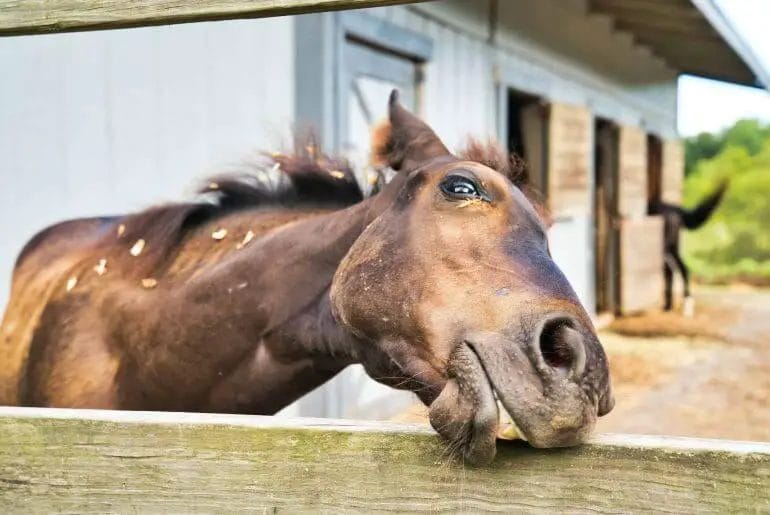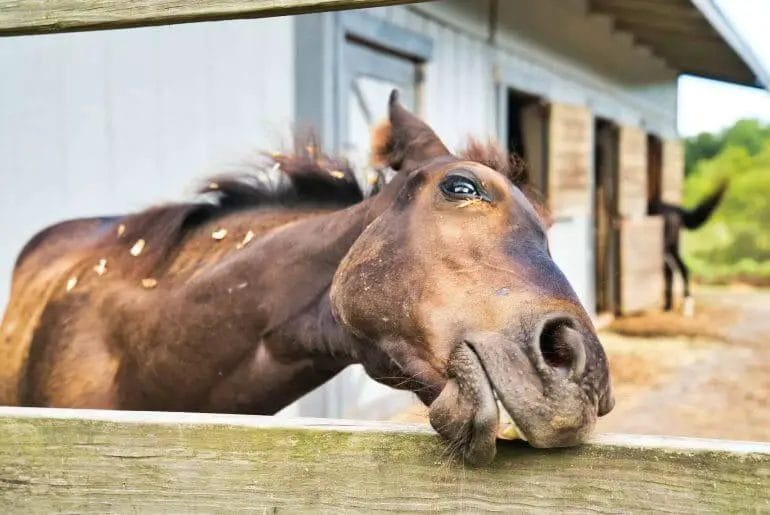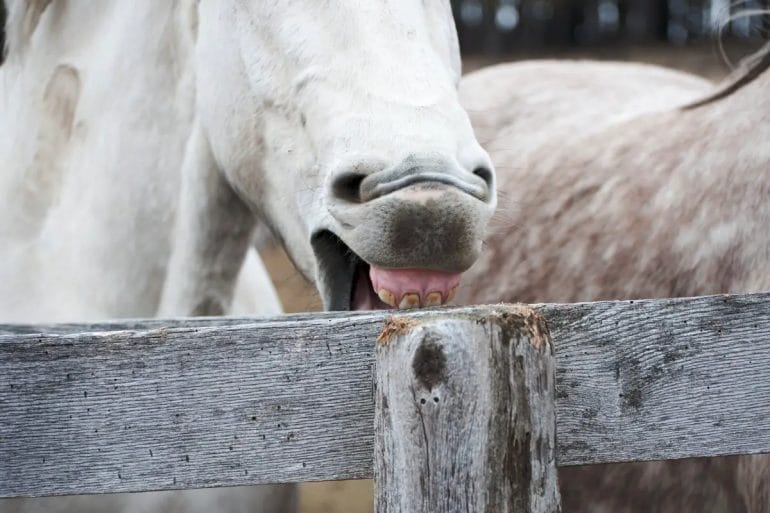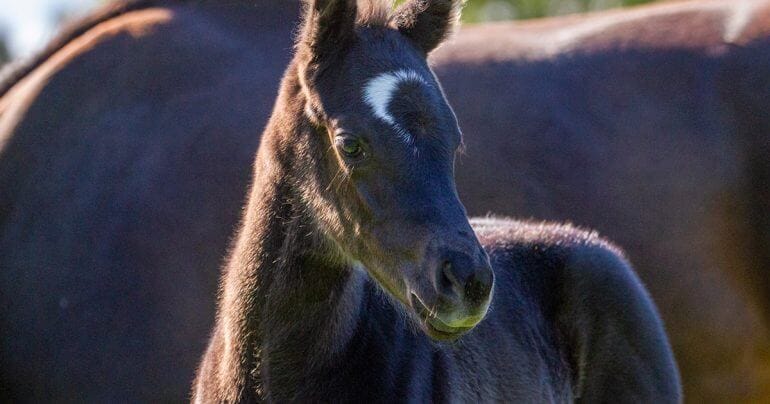Horses chewing on wood is a common behavior known as wood chewing or cribbing. It can be caused by a variety of reasons, including boredom, stress, or nutritional deficiencies. Wood chewing can have detrimental effects on a horse’s dental health and overall well-being.
One possible reason for wood chewing is insufficient forage or a lack of mental stimulation. Horses may resort to chewing on wood as a way to alleviate boredom or frustration. Providing ample grazing time and offering toys or other diversions can help prevent this behavior.

Stress is another factor that can lead to wood chewing. Horses that are confined to small spaces or have limited social interaction may develop this habit as a coping mechanism. Ensuring a horse has sufficient exercise, turnout, and companionship can help reduce stress-related wood chewing.
Nutritional deficiencies, particularly in their diet’s fiber content, can also contribute to wood chewing. A horse’s instinct to chew on wood may be an attempt to compensate for a lack of fiber. Working with a veterinarian or equine nutritionist to assess and adjust the horse’s diet can address this issue.
Wood chewing in horses can cause dental problems such as excessive wear, tooth breakage, and the potential for splinters. It can also lead to digestive issues if ingested wood obstructs the gastrointestinal tract. Therefore, it is important for horse owners to address wood chewing behavior promptly and implement measures to prevent it.
Understanding Equine Behavior: Why Do Horses Chew on Wood?
When it comes to understanding equine behavior, one common question that arises is why do horses chew on wood? This behavior, known as wood chewing or cribbing, can be a cause of concern for horse owners and caretakers. In this section, we will delve deeper into this behavior and explore the possible reasons behind it.
1. Natural Instincts
Horses have natural instincts that drive their behaviors, and chewing on wood may be one of them. In the wild, horses would often graze on grass and chew on tree barks for various reasons. Wood chewing could be a way for horses to fulfill their natural instinct to forage and explore their surroundings.
Additionally, wood chewing may also serve as a way for horses to alleviate boredom or anxiety. Similar to how humans fidget or chew on pens when feeling restless, horses may resort to chewing on wood as a means of self-soothing or stress relief.
2. Nutritional Deficiencies
Another possible reason for horses chewing on wood is nutrient deficiencies in their diet. Horses require a balanced diet that includes sufficient amounts of fiber, vitamins, and minerals. If a horse’s diet lacks certain nutrients, it may resort to wood chewing in an attempt to compensate for these deficiencies.
To prevent wood chewing due to nutritional deficiencies, horse owners should ensure that their horses are receiving a proper diet that meets all their nutritional requirements. Consulting with a veterinarian or equine nutritionist can help determine if any adjustments need to be made to the horse’s diet.
3. Dental Problems
Dental issues can also contribute to wood chewing in horses. Horses have continuously growing teeth, and if their teeth are not properly aligned or have sharp edges, it can cause discomfort or pain while eating. In such cases, horses may turn to chewing on wood as a way to alleviate the discomfort and promote proper dental wear.
Regular dental check-ups by a qualified equine dentist can help identify and address any dental problems that may be causing the wood chewing behavior.
4. Environmental Factors
The environment in which a horse is kept can also play a role in wood chewing behavior. Lack of adequate turnout or exercise, limited access to forage, or boredom-inducing living conditions can all contribute to a horse resorting to wood chewing as a form of entertainment or stress relief.
To minimize wood chewing caused by environmental factors, it is important to provide horses with a stimulating and enriching environment. This can include offering ample turnout time, providing a variety of forage options, and ensuring social interaction with other horses.
5. Learned Behavior
In some cases, wood chewing can be a learned behavior. Horses are highly intelligent and observant animals, and they may pick up on behaviors exhibited by other horses. If a horse sees another horse chewing on wood and observes that it leads to some form of reward or satisfaction, it may mimic the behavior and develop a habit of wood chewing.
To address learned wood chewing behavior, it is important to discourage the behavior and provide alternative outlets for the horse’s natural instincts and chewing needs. Offering suitable toys or objects designed for equine chewing can redirect their chewing behavior in a more appropriate manner.
Summary
In summary, wood chewing in horses can stem from various factors, including natural instincts, nutritional deficiencies, dental problems, environmental factors, and learned behavior. Understanding the underlying reasons behind this behavior is crucial for horse owners and caretakers to effectively address and manage wood chewing. By providing a suitable diet, regular dental care, a stimulating environment, and appropriate outlets for chewing, horse owners can help prevent or minimize wood chewing in their equine companions.

Health Risks and Consequences: Effects of Wood Chewing on Horses
Wood chewing is a common behavior seen in horses that can have detrimental effects on their health. While some horses may engage in this behavior out of boredom or as a result of nutritional deficiencies, it is important to understand the potential health risks and consequences associated with wood chewing.
One of the primary concerns with wood chewing is the damage it can cause to a horse’s teeth. Wood is much harder than the vegetation that horses naturally consume, and excessive chewing on hard surfaces can lead to dental problems such as tooth wear, fractures, and even abscesses. This can cause significant pain and discomfort for the horse, affecting their ability to eat and potentially leading to weight loss.
In addition to dental issues, wood chewing can also pose a risk of gastrointestinal blockages. Horses that chew on wooden fence posts, stall doors, or other structures may accidentally ingest splinters or larger pieces of wood. This can cause obstructions in the horse’s digestive system, leading to colic, a potentially life-threatening condition. Surgery may be required to remove the blockage, adding further stress and expense for the horse owner.
Furthermore, wood chewing can contribute to the spread of infectious diseases. Horses that engage in this behavior may come into contact with feces, urine, or other contaminants present on the wooden surfaces. Bacterial or fungal infections can occur if these pathogens enter the horse’s mouth or open wounds caused by the chewing behavior.
The consequences of wood chewing extend beyond the immediate health risks. In addition to the potential physical damage to the horse, wood chewing can also result in the destruction of property. Horses that chew on fencing or stall surfaces can cause costly damage to these structures, requiring repairs or replacement.
To address the health risks and consequences of wood chewing, it is important for horse owners to take appropriate measures. One approach is to ensure that the horse’s diet is nutritionally balanced, providing them with adequate fiber and minerals. This can help reduce the likelihood of nutritional deficiencies that may contribute to wood chewing behavior.
Providing environmental enrichment and mental stimulation is another key strategy. Boredom is a common trigger for wood chewing, so offering toys, varied turnout options, and social interaction can help alleviate this behavior. Regular exercise and access to grazing or hay can also reduce the horse’s desire to chew on wood.
If a horse continues to engage in wood chewing despite these preventative measures, it may be necessary to use deterrents. Applying products with a bitter taste or odor to the wood surfaces can discourage the horse from chewing. Physical barriers, such as electric fencing or metal grills, can also be used to prevent access to wooden structures.
In summary, wood chewing in horses can have serious health risks and consequences. It can cause dental problems, gastrointestinal blockages, and increase the risk of infections. Taking steps to address the underlying causes and provide appropriate mental and physical stimulation can help reduce wood chewing behavior and protect the horse’s overall health and well-being.

Solutions and Prevention: How to Stop Horses from Chewing Wood
Wood chewing in horses can be a frustrating and potentially dangerous habit. Not only can it lead to damage to fences, stalls, and other structures, but it can also pose a risk to the horse’s health if they ingest toxic substances or splinters. Fortunately, there are several solutions and prevention strategies that can help stop horses from chewing wood.
1. Provide Sufficient Forage
Horses have a natural instinct to chew, and if they don’t have enough forage, they may resort to chewing on wood. Ensure that your horse has access to plenty of good-quality hay or pasture throughout the day to satisfy their grazing needs.
2. Evaluate the Diet
A nutritional deficiency or imbalance in the horse’s diet can contribute to wood chewing behavior. Work with a veterinarian or equine nutritionist to evaluate your horse’s diet and make any necessary adjustments to ensure they are receiving all the essential nutrients they need.
3. Provide Enrichment
Horses that are bored or lack mental stimulation may turn to wood chewing as a form of entertainment. Provide them with various forms of enrichment, such as toys, treat balls, or hanging feeders, to keep them occupied and engaged.
4. Apply Taste Deterrents
Taste deterrents can be effective in discouraging horses from chewing on wood. There are commercially available sprays and paints that have a bitter or unpleasant taste, which can deter horses from gnawing on wooden surfaces. Apply these deterrents to the areas the horse tends to chew on.
5. Cover Exposed Edges
If your horse tends to chew on specific edges or corners of structures, consider covering them with materials that are less appealing to chew on, such as rubber, metal, or PVC pipes. This physical barrier can help protect the wood and redirect the horse’s chewing behavior.
6. Maintain Dental Health
Dental issues, such as sharp edges or uneven teeth, can contribute to wood chewing. Schedule regular dental examinations and floating procedures for your horse to ensure their teeth are in good condition and do not lead to oral discomfort or frustration that may result in wood chewing.
7. Correct Any Underlying Behavioral Issues
Sometimes, wood chewing may be a result of stress, anxiety, or other underlying behavioral issues. It’s important to identify the root cause and address it accordingly. Consult with a professional trainer or equine behaviorist to develop a behavior modification plan tailored to your horse’s specific needs.
8. Provide Adequate Exercise and Turnout
Regular exercise and turnout are essential for a horse’s physical and mental well-being. Make sure your horse gets enough exercise and time outside in a safe and secure environment. This can help alleviate boredom and reduce the likelihood of wood chewing.
9. Regularly Inspect and Repair Structures
Perform regular inspections of fences, stalls, and other wooden structures to identify any damage or signs of wood chewing. Promptly repair or replace any affected areas to discourage the behavior and prevent further damage.
10. Consult with a Veterinarian
If the wood chewing behavior persists despite implementing preventive measures, it’s advisable to consult with a veterinarian. They can rule out any underlying health issues that may be contributing to the behavior and provide further guidance on managing the problem.
In summary, wood chewing in horses can be addressed through a combination of solutions and prevention strategies. Ensuring sufficient forage, evaluating the diet, providing enrichment, applying taste deterrents, covering exposed edges, maintaining dental health, addressing underlying behavioral issues, providing adequate exercise and turnout, regularly inspecting and repairing structures, and consulting with a veterinarian are all effective measures to stop horses from chewing wood and promote their overall well-being.
Alternative Behaviors: Redirecting Wood Chewing in Horses
Horses are naturally inclined to chew, and this can sometimes lead to destructive behaviors such as wood chewing. Wood chewing not only damages fences and structures but can also pose a risk to the horse’s health if they ingest wood splinters. It is important for horse owners to find alternative behaviors to redirect the horse’s chewing instincts and prevent wood chewing. In this section, we will explore some effective strategies to redirect wood chewing in horses.
1. Increase Forage Intake
One of the primary reasons horses engage in wood chewing is due to a lack of forage. Horses are grazing animals and require a constant supply of roughage to keep their digestive system healthy and satisfy their natural chewing instincts. By providing ample access to pasture or high-quality hay, you can help fulfill their forage needs and reduce the likelihood of wood chewing.
Additionally, you can consider using slow-feed hay nets or hay feeders with smaller openings to prolong the eating time and simulate grazing behavior, preventing boredom and the urge to chew on wood.
2. Provide Environmental Enrichment
Horses that exhibit wood chewing behavior may be bored or lacking mental stimulation. To address this, it is important to provide them with environmental enrichment. This can be done by:
- Using treat-dispensing toys that require the horse to work for their reward, keeping them engaged and mentally stimulated.
- Placing large balls or other safe toys in the horse’s paddock or pasture for them to play with.
- Rotating pasture turnout or creating small turnout areas with varied terrain and obstacles, encouraging natural movement and exploration.
3. Regular Exercise and Turnout
Regular exercise and turnout are essential for a horse’s physical and mental well-being. Lack of exercise and confinement can contribute to stress and boredom, leading to wood chewing. Ensure that your horse receives adequate daily exercise and turnout time in a safe and suitable environment.
4. Use Deterrents
If the above strategies do not completely eliminate wood chewing behavior, you can consider using deterrents to discourage the horse from chewing on wood surfaces. Some effective deterrents include:
- Applying commercial anti-chew sprays or bitter-tasting substances to the wood surfaces. These substances taste unpleasant to the horse and deter them from chewing.
- Wrapping wood surfaces with smooth wire or electric tape, making it less appealing for the horse to chew.
5. Consult with a Veterinarian or Equine Behaviorist
If wood chewing persists despite implementing the above strategies, it may be beneficial to seek advice from a veterinarian or equine behaviorist. They can assess the horse’s overall health and behavior, identify any underlying issues, and provide tailored recommendations to address the wood chewing behavior.
Summary
Wood chewing in horses can be a destructive behavior that poses risks to both the horse and its surroundings. By redirecting the horse’s chewing instincts through alternative behaviors, such as increasing forage intake, providing environmental enrichment, ensuring regular exercise and turnout, using deterrents, and seeking professional advice if needed, horse owners can effectively manage and prevent wood chewing. Remember that each horse is unique, and it may require some trial and error to find the most suitable strategies for redirecting wood chewing behavior.
FAQs
1. Why do horses chew on wood?
Horses may chew on wood due to boredom, dietary deficiencies, or dental issues. Providing enough grazing time and offering appropriate forage can help prevent this behavior. Regular dental check-ups and providing enrichment activities can also discourage wood chewing.
2. How can I prevent my horse from chewing on wood?
To prevent wood chewing in horses, ensure they have access to sufficient grazing time and quality forage. Providing appropriate toys, such as treat balls or hanging objects, can also help redirect their chewing behavior. Regular dental check-ups are vital to address any dental issues that may contribute to wood chewing.
3. Is wood chewing harmful to horses?
Wood chewing itself may not be harmful to horses, but it can lead to several issues. It can cause dental problems, digestive issues if they ingest wood splinters, and can damage fences or stable structures. Preventing wood chewing is essential to maintain the horse’s health and prevent damage to property.
Conclusion
In conclusion, horses chewing on wood can be attributed to several factors. Firstly, it may be a result of boredom or insufficient mental stimulation. Wood provides a readily available and engaging object for horses to interact with. Additionally, horses may chew on wood as a way to alleviate stress or anxiety. It can serve as a coping mechanism in certain situations. However, wood chewing can be detrimental to a horse’s health, leading to dental issues and the risk of ingesting harmful splinters. Therefore, it is essential for horse owners to address the underlying causes and provide alternative forms of enrichment and stress relief for their equine companions.